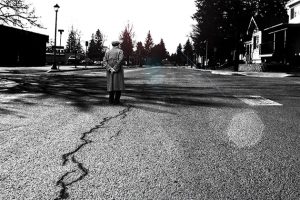“Freud drops the empirical disguise and we see him as a writer of pure fictions. Ever since, we are all, in this field of psychotherapy, not medical empiricists, but workers in story.” ~ James Hillman
I write frequently about personal story, about history and narrative and how those things go into shaping everything in our lives – the good and the bad. It is sometimes a difficult concept to get across. Most men have a healthy reliance on straightforward sensibilities. We approach our lives practically and use logic and common sense to solve problems. At least outside of our relationships with women, those things serve us well and reliably to navigate through life.
For the sake of personal experimentation, I want to ask you to consciously suspend some measure of disbelief and participate for a short time in a more transcendental pursuit. We could even call this an exploration in the realm of fantasy. And indeed for the purpose of this article, that is precisely how we can look at our lives — as works of fiction, incomplete and in need of editing.
Or like a series of images that spell out our history and self-perception. Some of those images are clear and dominant, others are faded and barely visible. Or, if you prefer to imagine this in literary terms, parts of our narrative are dominant while other parts fade and are sometimes lost or forgotten.
To help illustrate this a bit more, I am going to borrow from family systems work and birth order mythology. While there is little particularly scientific about this, and many exceptions to the birth order mythos, people often find there are stereotypical birth order traits that personally resonate in their lives. And there is some science that would seem to support those perceptions.
A 2007 Norwegian study, for instance, concluded that firstborns had two to three more IQ points than children born after them. That is according to Dr. Frank J. Sulloway, author of Born to Rebel, Birth Order, Family Dynamics, and Creative Lives.
However interesting that may be, we won’t, as we saw in the quote from Hillman at the start, busy ourselves with so much with science, but with the transcendent power of our imagination. It is the story, and under whose control it is told, that matters.
The birth order traits in three offspring are, in descending order, roughly are as follows.
The first born. The hero child. The role of this child is as the bearer of the family’s honor. He is the good student, industrious, and accomplished. He gives the family a sense of pride. He often goes on to success in life. And he becomes the standard to which his siblings are held by the parents. They either do this overtly or covertly, but the message is clear. The hero is where the bar is set.
The middle born. The lost child. The role of this child is to lessen the load on the family by not having needs. They tend to be loners, disconnected from others. They may train themselves to believe they don’t need people. You can’t punish the lost child by sending him to his room. That is where he usually wants to be anyway.
The last born. The scapegoat child. The role of this child is to bear the families sins, as it were. He is the rebel that points, often wildly, to the elephant in the room. He is the one who acts out and the one the family burdens with all their unacknowledged dysfunction. He lives in a world of pointing fingers, blame and often abuse. He tends to react to those things with defiance.
Again, these are very simplified versions of these roles. Birth order roles don’t always follow birth order. They can be affected by sex and other factors, and they can change with time. There is overlap between roles as well. It’s a very fluid situation.
But chances are that most men can read about these three simple roles and find themselves somewhere in the mix. They can identify with the imagery of at least one of them. What happens, though, is that the iconography of the life story often becomes fixed, narrow and limiting.
For example, the hero can be trapped in a single image. Imagine the attorney or the businessman who watched his secret dreams of being a musician or woodworker fall away from the pressure of giving the family their trophy son. Imagine the possible resentments that were buried alongside a good bit of his individuality, and the unspoken stresses of carrying the family weight from the time he was born.
Think of the lost child, who trains himself to the impossible task of being needless, of forsaking human connection and interdependence because his single image of life, his only story, is of not being a burden. Imagine that the cost of any relationship outweighs the reward. And imagine the countless number of unseen possibilities, the life gifts never realized simply because the lost child, in order to survive their loneliness, develops the belief that the gifts are not needed.
Finally, consider the scapegoat, as the possibility of family connection slowly fades from life as he accepts an image of humanity that cannot be trusted. There’s one benefit for the scapegoat. Of the three roles, he is the one who is most likely capable of escaping. But at what cost? And what becomes of his chances for his filling a different role in life?
The point here is that in each of these roles, the primary image or story – the one he is pressured to lock on to — is one that tends to overshadow all other possibilities. And for most men, these are not roles that are discarded once grown and on their own in life. In my experience with men, time and time again, I have seen then carry that imagery into new families. Heroes become champions of their homes, often accomplishing great things, even as the wants and desires from their childhood become cold in the ground.
Lost children, who can become lost men, sometimes continue their needless lives in the service of others. They leave one family of which they demanded nothing and create another in which they do the same thing. They often, simply for lack of vision, pick women who need much and give little, just as their family of origin was willing to do.
Scapegoats, like heroes and lost children, tend to follow their life imagery to the same end. They pick women who will burden them with blame; women who will, just as their family did, refuse to look at their role in problems. Needless to say, scapegoated men often have their choice of a lot of women. And there is no shortage of them who wind up alienated and carrying blame that does not belong to them.
The point here is not to say that men’s lives are fixed in whatever was handed to them by their family. Quite the contrary. And it would do most men well to remember that these are existential problems. Humanity made it quite far without obsessive exploration of purpose and identity that are now modern indulgences.
Still, the accomplishments of men throughout ages made it possible to strain against the weight of a crisis in identity. We can now look at where we came from, and maybe ponder a good bit longer on the story behind the story, the picture behind the picture that has always remained hidden. And we can perhaps decide more consciously what we want to be, and just as importantly, know why we are doing it.
The trick is in the ability to see that our lives are all in some sense a fiction, a story that we can still shape. It requires will. It requires a healthy sense of detachment, and by detachment I mean the ability to stand back from your own story, from the pleasure and the pain and from any emotional investment in its outcome. And it requires a creative mind.
Hillman said, and I am paraphrasing here, “rather than psychology, we undergo our best transformation when we engage in a craft – with our hands, intellectually, imaginatively or whatever. It can be knitting blankets, building boats, or constructing a philosophy….. and as we come across difficult parts in those processes, in the craft, we untangle our own knots.”
What I am suggesting here is that the transformation Hillman is referring to is the recrafting of our own story. That means to some degree throwing science and psychology out of the window. In the realm of human experience, science and psychology are equally useless.
It is the artist in you that matters. The writer. The creator.
I wanted to write from a very early age. It was severely frowned upon by my parents. Not in overt terms, but in a quiet, nearly unspoken “be more like your hero brother” way. There is no real blame for that on them. They were simply people following the unconscious imagery of their own lives. Still, the message set in and I did not write. Not for years and years. Now I have written over a thousand articles, and this (above left) is me at the Second International Conference on Men’s Issues autographing a copy of one of my books.
I am not saying I have slayed all my demons or finished the rewriting of my life story. I am just saying it is possible. And if a mug like me can do it, anyone can.








Most Commented Posts